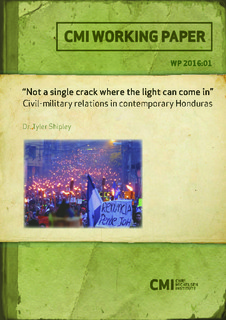| dc.contributor.author | Shipley, Tyler | |
| dc.date.accessioned | 2018-01-04T08:21:49Z | |
| dc.date.available | 2018-01-04T08:21:49Z | |
| dc.date.issued | 2016-01-01 | |
| dc.identifier | oai:www.cmi.no:5750 | |
| dc.identifier.citation | Bergen: Chr. Michelsen Institute (CMI Working Paper WP 2016:1) 32 p. | |
| dc.identifier.isbn | 82-8062--577-9 | |
| dc.identifier.issn | 0804-3639 | |
| dc.identifier.uri | http://hdl.handle.net/11250/2475251 | |
| dc.description.abstract | This CMI Working Paper draws from several years of research in Honduras, including a series of interviews in February 2015, to assess the relationship between civilian and military authority in Honduras today. It highlights the military coup of June 2009 as a turning point wherein the trend towards increased democratic civilian governance was reversed, setting into motion a chain of events that have re-asserted the primacy of the military. It concludes with an evaluation of the current mobilizations of civil society, manifest in major ongoing public demonstrations, and the prospects for reversing the slip into authoritarian rule under Juan Orlando Hernández. | |
| dc.language.iso | eng | |
| dc.publisher | Chr. Michelsen Institute | |
| dc.relation | CMI Working Paper | |
| dc.relation | WP 2016:1 | |
| dc.relation.ispartof | CMI Working Paper | |
| dc.relation.ispartofseries | CMI Working Paper WP 2016:1 | |
| dc.relation.uri | https://www.cmi.no/publications/5750-not-a-single-crack-where-the-light-can-come-in | |
| dc.subject | Military Civilian Relations | |
| dc.subject | Honduras | |
| dc.title | “Not a single crack where the light can come in” Civil-military relations in contemporary Honduras | |
| dc.type | Working paper | |
